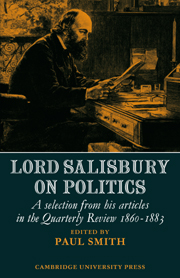Book contents
- Frontmatter
- Contents
- Preface
- List of abbreviations
- Editor's introduction
- Bibliographical note
- ‘The Budget and the Reform Bill’ (April 1860)
- ‘The House of Commons’ (July 1864)
- ‘The Reform Bill’ (April 1866)
- ‘The Change of Ministry’ (July 1866)
- ‘The Conservative Surrender’ (October 1867)
- ‘The Programme of the Radicals’ (October 1873)
- ‘Disintegration’ (October 1883)
- Index
- Cambridge Studies in the History and Theory of Politics
‘The House of Commons’ (July 1864)
Published online by Cambridge University Press: 06 July 2010
- Frontmatter
- Contents
- Preface
- List of abbreviations
- Editor's introduction
- Bibliographical note
- ‘The Budget and the Reform Bill’ (April 1860)
- ‘The House of Commons’ (July 1864)
- ‘The Reform Bill’ (April 1866)
- ‘The Change of Ministry’ (July 1866)
- ‘The Conservative Surrender’ (October 1867)
- ‘The Programme of the Radicals’ (October 1873)
- ‘Disintegration’ (October 1883)
- Index
- Cambridge Studies in the History and Theory of Politics
Summary
INTRODUCTORY NOTE
The early sixties were years of remarkable placidity in British politics. In the comfortable atmosphere of mid-Victorian prosperity, the personal position of Lord Palmerston, who reached the age of eighty in 1864, was not seriously challenged, and the genial conservatism which he purveyed seemed for the moment to suit the country's mood. Indeed, it went down so well as to render the competing product, offered by the official Conservative party, something of a drug in the market. With Palmerston in possession of the conservative cause, and of much of conservative sentiment, Derby was virtually compelled to acquiesce in his reign, and to prop him up against the more radical elements in his heterogeneous following. Disraeli's co-operation in this policy was so impeccable that Lord Robert felt no need to refurbish the philippics of 1860. The result was that domestic politics, without major issues or keen party strife, became very flat. Reviewing a year of peace, prosperity, and calm, the Annual Register for 1864 wrote: ‘The spirit of party, indeed, appeared to have lost nearly all its acrimony, and even a large share of its vitality, both in Parliament and in the country at large; it seemed as if few questions remained to divide in any material degree the opinions of the different sections of politicians.’ Perhaps the main focus of attention in this period was less any domestic topic than the tremendous struggle of the American Civil War, which, breaking out in 1861, divided British opinion (Conservatives, including Lord Robert, tending to sympathise with the South), and caused considerable distress in Lancashire and elsewhere by interfering with the supply of raw cotton to the textile industry.
- Type
- Chapter
- Information
- Lord Salisbury on PoliticsA selection from his articles in the Quarterly Review, 1860-1883, pp. 159 - 192Publisher: Cambridge University PressPrint publication year: 1972

